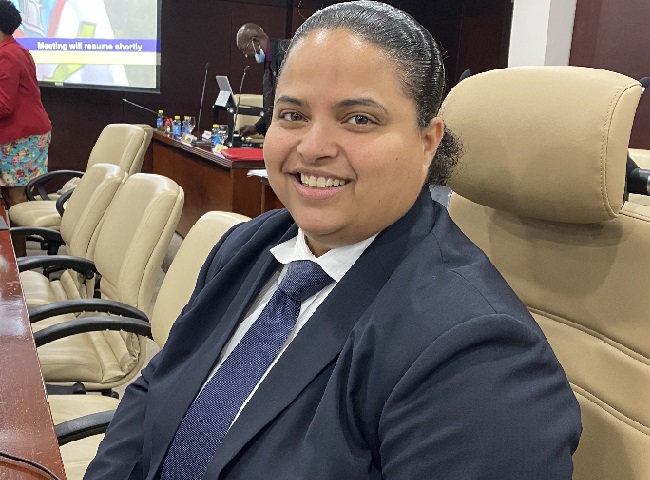Issues Facing Students Also Discussed
PHILIPSBURG – Party for Progress member of Parliament and faction leader, Melissa Gumbs, shared her experiences at the Fall 2022 IPKO session. IPKO is the coming together of all four Parliaments in the Kingdom of the Netherlands to discuss a variety of topics that impact each country or the Kingdom as a whole. This session of IPKO was held in The Hague, the Netherlands, from September 26 to 30.
As is customary, Monday, September 26th kicked off the week with the Tripartite session, where the three Caribbean Parliaments in the Kingdom come together to first discuss those issues that impact their respective countries. While much of the discussion is kept closed, Gumbs was able to share a bit about one of the presentations received, which she stated was a subject close to her heart.
“We received a presentation from the National Ombudsman,” Gumbs stated, “on the issues facing our students before, during and after their time in the Netherlands. Of course, DUO and the complications of obtaining a BSN were at the top of the list. But the National Ombudsman also noted that there remain serious issues with the guidance students receive when choosing their study path and major.”
Gumbs highlighted that this issue has been prevalent since she was in high school. She noted that the foundation she co-founded while in the Netherlands, Unified St. Maarten Connection (USC) had previously been advocating for and working with stakeholders to improve the level of guidance and counseling that the students receive before traveling to the Netherlands.
“There have consistently been complaints about the preparation of our students for when they travel to further their studies,” Gumbs continued, “and this research by the National Ombudsman has shown that these issues persist. The responsibility to address it lies not just with the Ministry of Education, Culture, Youth and Sports, but particularly with the high schools and the persons they employ to provide said guidance.”
Following Tripartite, IPKO itself kicked off with opening sessions at the First Chamber, where the situation of each country was presented by their delegation leader. It remained clear, according to Gumbs, that ongoing global realities continue to impact all four countries within the Kingdom, with all four reporting issues with inflation, economic growth, and sustainability.
For Gumbs, though, the highlight of this fall’s IPKO session were the presentations and discussions over the democratic deficit in the Kingdom, as well as on colonialism and slavery. Attendees received a presentation from Professor Dr. Gert Oostindie and Dr. Wouter Veenendaal about collaboration and the democratic deficit, offering insights into similar, and different, political relationships in the world, which Gumbs said just made it more evident that without persons brave enough to approach the task of modernizing the Kingdom Charter, not much change can be expected. However, she did agree with both presenters when they explained that in the short-term, other potential resolutions should be sought, as the process of changing the charter takes some time.
Wednesday’s IPKO sessions ended with presentations regarding the Kingdom’s role in colonialism and the slave trade, coming from Dr. Valika Smeulders of the Rijksmuseum, Mr. Mike Bindraban, Project Leader of City Program Colonial & Slavery History of Rotterdam, and Mr. Gilbert Bacilio of House of Culture Curacao Foundation. This was the first time the agenda point appeared on the IPKO program, something Gumbs believes is significant and noteworthy.
“All three presenters held our attention,” Gumbs states, “and I took special notice of Mr. Bindraban’s point of ‘geen woorden maar daden,’ so not just words, but actions. The discussion afterwards, in my group session, was very insightful and encouraging. It was also discussed to have this topic on the agendas of future IPKOs, with the idea of putting actions behind the words in mind. It’s my belief that this will strengthen the value of IPKO as a tool to improve and maintain the relationships between the four countries.”




























